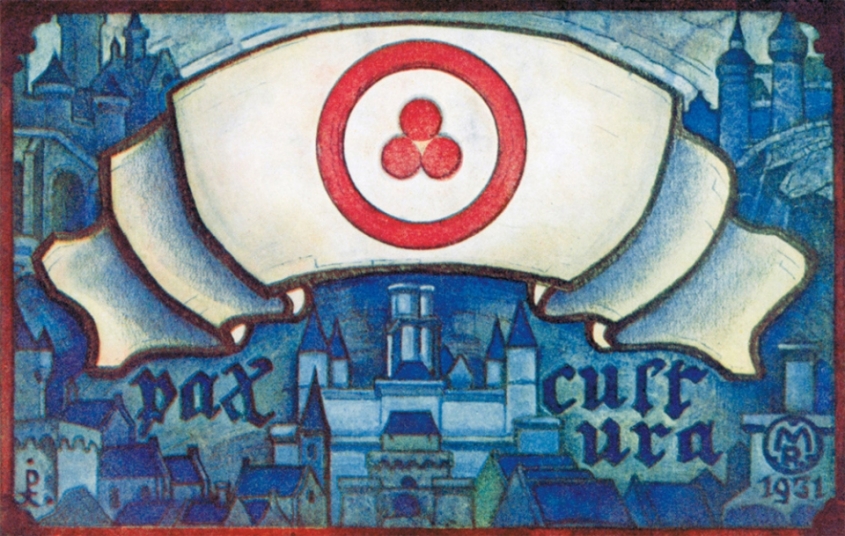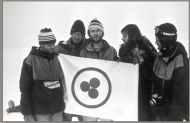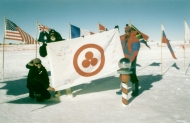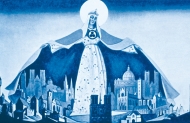
The date is associated with the signing on this day in 1935 in Washington (USA) of the agreement “On the Protection of Artistic and Scientific Institutions and Historical Monuments,” which became known in international legal practice as the Roerich Pact.
In 1998, the initiative to celebrate the day of signing the pact as the Universal Day of Culture was taken by the public organization International League for the Defense of Culture, founded in 1996 by the International Center of the Roerichs.
The idea of the need for a special agreement on the protection of educational institutions and cultural monuments first arose from the famous Russian artist and philosopher Nicholas Roerich (1874-1947) during the Russo-Japanese War (1904-1905). In 1929, Roerich turned to governments and peoples with a well-developed draft of an international treaty, which asserted the advantage of preserving cultural heritage over military necessity. He was supported by many famous cultural and scientific figures of those times: Albert Einstein, Bernard Shaw, Herbert Wells, Thomas Mann and others. The draft Roerich Pact was approved by the Committee on Museum Affairs of the League of Nations and the Pan-American Union, and committees were established in Belgium, France, the USA and India to disseminate the ideas of the Pact.
In September 1931, the first international conference dedicated to the Roerich Pact was held in the city of Bruges (Belgium), an action plan was adopted to disseminate the ideas of the Pact, and the International Union of the Roerich Pact was created.
In 1932, the second international conference of the Roerich Pact was held in Bruges with the participation of 22 countries, which decided to establish the Banner of Peace Foundation for worldwide assistance in implementing the ideas of the Roerich Pact.
The third conference, held in 1933 in Washington, was supported by 35 countries. It recommended that the governments of all countries sign the Roerich Pact.
On April 15, 1935, in Washington at the White House, representatives of 21 states of the American continent signed an agreement “On the Protection of Artistic and Scientific Institutions and Historical Monuments.” The pact included general principles on the protection of cultural property and the respect that should be given to it. The provision for the protection of objects is unconditional and is not weakened by clauses of military necessity.
The document became the first international legal act specifically dedicated to the protection of cultural property, the only agreement in this area adopted by part of the world community before the Second World War (1939-1945).
The historical significance of the Pact lies in the fact that it became a fundamental element of the legal and organizational system of international protection of cultural heritage, which was formed after the Second World War. It has been used as the basis for documents of international cooperation in the field of protection of cultural heritage, including such UNESCO acts as the “Convention for the Protection of Cultural Property in the Event of Armed Conflict”, adopted in The Hague (Netherlands) on May 14, 1954, the “Convention for the Protection of World Cultural and Natural Heritage", adopted in Paris (France) on November 16, 1972.
Subsequently, the ideas of the pact were developed in the “Universal Declaration on Cultural Diversity” (2001) and the “Declaration on the Deliberate Destruction of Cultural Heritage” (2003) of UNESCO, the “Convention on the Protection and Promotion of the Diversity of Cultural Expressions” of the UN (2005) and other international documents.
2024 marks the 150th anniversary of the birth of Nicholas Roerich. As part of the anniversary events, the International Center of the Roerichs organizes exhibitions, scientific conferences, round tables, lectures, festivals, etc.
On March 21, 2024, as part of the exhibition “The Universe of the Master”, dedicated to the 150th anniversary of the birth of the great Russian artist, thinker, traveler and public figure Nicholas Roerich, a round table was held at the Russian House in Delhi, organized by the International Center of the Roerichs, the Embassy of the Russian Federation in the Republic of India, Russian House in New Delhi, Indian Association of Teachers of Russian Language and Literature, National Center for Public Diplomacy of the Shanghai Cooperation Organization in Russia, International Union of Non-Governmental Organizations “Eurasian Peoples' Assembly”.
Welcoming the participants, Secretary General of the Eurasian Peoples' Assembly Andrei Belyaninov emphasized the relevance of educational activities and the importance of introducing young people from different countries to the study of world cultural heritage.
The material was prepared using information from RIA Novosti









